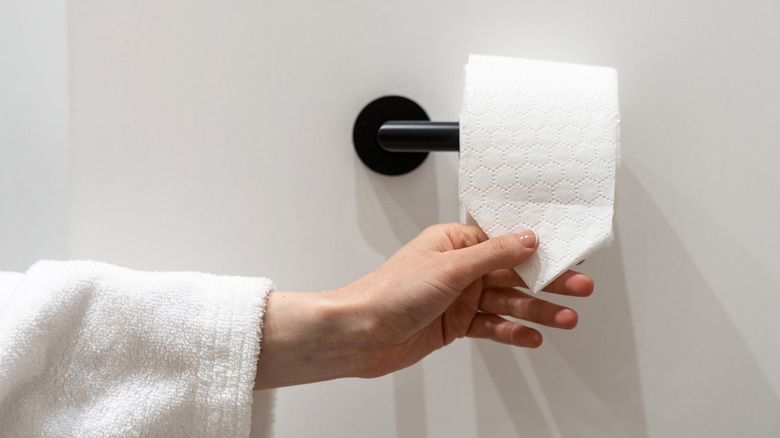What The Smell Of Your Poop Can Tell You About Your Health
Here's the truth, and it kind of stinks: Poop is expected to smell bad, no matter who it's from. With that said, there has to have been at least one time in your life when, after finishing your business in the toilet, you said to yourself, "Whew, that smells a bit stronger than usual." You may not have given it much thought back then, and that's fine. According to Healthline, stinky stools are typically due to your gut bacteria, which is in turn influenced by the kind of food you consume during the day.
However, when your poop smells especially putrid, it could be a sign that something's not quite right inside your body. Aside from the pungent smell, a few good indicators of this are the occurrence of diarrhea, excessive gas release, or soft, watery fecal matter. Another possible symptom is if you feel bloated as you defecate. Still, it's hard to say exactly what's going on inside your body just by gauging how strong the stench of your stool is. There are multiple ways to explain your majorly malodorous excrement — and in some cases, you may need to seek medical attention as soon as possible. From underlying illnesses to dietary difficulties, here are some of the things the smell of your poop can tell you about your overall health.
You may be suffering from a viral or bacterial infection
According to Medical News Today, a viral, parasitic, or bacterial infection may explain your particularly fetid feces. One of the most common examples is gastroenteritis, which is also referred to as stomach flu (via WebMD). A condition that is typically viral or bacterial in nature, gastroenteritis can hit people of all ages and cause watery diarrhea along with a headache, fever, and vomiting. If not treated promptly, it can lead to dehydration, especially in children.
A salmonella infection, which usually happens when you consume contaminated foods or undercooked chicken meat, can also cause your stool to have a strong, unpleasant odor (per the University of Rochester Medical Center). In some cases, there may be a bit of blood in your poop as well. Yet another condition that can cause poop that's stinkier than usual is an infection due to the Clostridioides difficile bacterium. As the Centers for Disease Control and Prevention explains, C. difficile can cause both colon inflammation and diarrhea, and is reportedly responsible for nearly 500,000 cases of infection among U.S. patients annually. Due to their similar symptoms, a medical professional may sometimes ask a patient to provide stool samples for both salmonella and C. difficile testing.
Lastly, giardiasis is an intestinal infection brought about by a tiny parasite called Giardia intestinalis, causing greasy and foul-smelling diarrhea (via the Cleveland Clinic). Based on patient statistics in the United States, it is the most common parasite-related intestinal infection.
You might be having trouble digesting certain types of food
Occasionally, stinky poop can indicate that specific kinds of foods are giving your body a hard time, kicking your digestive system into overdrive or even causing an allergic reaction. A typical example is lactose intolerance, which happens when a person does not produce enough of the enzyme called lactase in their small intestine (via the Cleveland Clinic). Lactase enables the body to properly process and digest lactose, a kind of sugar found in milk- and milk-based products. Due to this lactase deficiency, the body prompts the large intestine to produce more fluid and break up the undigested lactose, subsequently giving poop a more putrid smell.
On the other hand, a person with a milk or dairy allergy — which is not the same as lactose intolerance — goes through the common symptoms of an immune reaction (e.g., rashes, swelling of the tongue and lips, hives, and throat tightness) due to their body treating milk proteins like unwanted pathogens (per WebMD). The patient may also experience smelly, runny, and even bloody stools.
Last but not least, foul-smelling feces can also be the result of an autoimmune illness called celiac disease. According to the Celiac Disease Foundation, celiac disease patients are unable to properly digest and absorb foods with gluten, a protein found in barley, rye, and wheat, because their bodies react to it as if it were an allergen. One in every 10 people reportedly develops this underdiagnosed, genetically predisposed disease.
What you've been eating recently may be making your poop stink
It should come as no surprise that whatever finds its way into your body affects what comes out of it. So when you notice that your poop has a stronger stench than usual, your meal preferences likely hold the answer.
For starters, a diet rich in sulfur can make your stools stink, according to Insider. That's because the compounds in this essential mineral are responsible for the less-than-pleasant smell we've all come to associate with our poop. Thus, if your diet includes a lot of eggs, onions, potatoes, carrots, radishes, and cruciferous vegetables (such as broccoli, cabbage, and cauliflower), you can expect to smell the evidence. With that said, it's not a good idea to try to eliminate sulfur from your meals just to make your poop less stinky. As with everything else, moderation is key.
People on low-carb or ketogenic diets may be consuming far more fat-rich foods than the average person. High-fat foods can have a tendency to move along more slowly (and thus, sit around longer) in the body, as the digestive system finds it more challenging to process and absorb all of that fat (via Men's Health). Combine that with increased consumption of protein, sugar alcohols (e.g., sorbitol), and non-nutritive sweeteners, and you'll likely end up with putrid-smelling poop. Lastly, drinking alcohol in large quantities can also make your poop stink by affecting your gut flora (per Men's Health).
You're taking certain medications or supplements
It's hardly news that medications, supplements, and multivitamins can come with different side effects. What some may not be aware of is that one of those side effects can be smellier poop.
Multivitamins, for instance, can cause your stool to stink worse than it normally does (via Healthline). This can be the result of your body having an allergic reaction to the ingredients found in such over-the-counter supplements. It's also possible that your foul-smelling feces are the direct consequence of you ingesting more than the amount that your body actually needs per day. Be warned, though: while smellier poop is an inconvenient side effect of multivitamin overdosing, diarrhea and gastrointestinal pain — especially when you're taking in too much vitamin A, vitamin E, vitamin K, or vitamin D — necessitate a trip to the doctor.
According to experts at Buoy Health, changes in your poop's smell and consistency can also be the result of antibiotic intake. When you ingest antibiotics for a certain period of time, they tend to affect the mix of bacteria in your gut, producing stool with a stronger stench. Don't worry, though, because these effects aren't permanent. Typically, you can expect your poop to regain its usual level of, er, stink between two weeks and a month, or after you finish the prescribed period of time you're supposed to take your antibiotics (whichever happens first).
You might have short bowel syndrome
Particularly foul-smelling stools can also be explained by a condition called short bowel syndrome. It is literally what its name says it is: It happens when a person's small intestine is too short or missing some parts (via Mayo Clinic). As a result, the body has trouble properly digesting and absorbing nutrients from food (and produces greasy, smelly poop). There are a couple of reasons why a person can have a shorter small intestine than most folks. Some are simply born with a damaged small intestine, or a small intestine with missing parts. Others may have had portions of their small intestine removed via surgery due to serious diseases such as cancer or Crohn's disease. In addition to putrid-smelling poop, people with short bowel syndrome may also become more easily fatigued or experience alarming weight loss.
Fortunately, people with short bowel syndrome have a number of options when it comes to dealing with their condition, depending on what their doctor recommends and the affected parts of their small intestine. Surgery may be required, either to increase the length of the intestine or to control the speed at which nutrients pass through it. Medication for alleviating diarrhea, improving absorption of nutrients, or controlling stomach acid may be prescribed, especially post-surgery. Lastly, patients with short bowel syndrome may be advised to adjust their diet, take nutrition intravenously or via a feeding tube, or take supplements to cover their nutritional deficiencies.
When should you see a doctor?
Admittedly, when you notice that the smell of your poop is stronger than usual, it is tempting to simply shrug it off and wait for things to go back to normal. And while this isn't an inherently wrong attitude, certain situations require immediate medical consultation (via Medical News Today).
For example, if your stinker-than-usual stools are black or pale in color, contain traces of mucus and pus, or are bloody, you should definitely see a doctor. Other symptoms that can be cause for concern are a drastic increase or decrease in weight, more frequent instances of fatigue or confusion, sluggishness, abdominal pain, back pain, fever, night sweats, itchy bumps on your skin, and serious allergic reactions. These may hint that there's something much more serious going on in your body. Bloating and gas, diarrhea, and constipation are also serious red flags, as well as heartburn, vomiting, loss of appetite, muscle cramps, and pain in your bones or joints.







